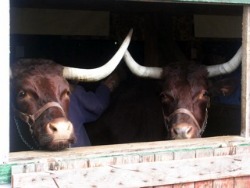
Cows are good sources of manure, but steers raised in feed lots may have manure with a high salt content due to being fed salt licks.
Although not as glamorous as compost and other organic fertilizers, animal manure is a good thing for the garden. Manures offer lots of soil improvement advantages to an edible gardener. They help build the organic matter content, add nutrients, increase microbial activity, and improve drainage in heavy soils and moisture retention in sandy soils. The key to using animal manure is knowing what type you have, when to apply it, and how to spread it. So here's your guide to the scoop on poop.
Compost That PoopIt's best to either compost fresh manure or used well-aged manure that’s been sitting for at least six months. Fresh manures can contain bacterial pathogens such as E. coli and parasites such as roundworms and tapeworm that can infect humans. If composted properly to 140 degrees F, these hazards are minimized. Check here for the proper technique on building a hot compost pile.
If you're having a farmer spread fresh manure on your garden, it's best to apply it the fall before you garden. This will give it time to breakdown. If you must apply undecomposed manures in spring, do so 120 days before harvesting any leafy green crop or root crops and 90 days before harvesting any above ground fruiting crops. Never use uncomposted animal manure as a side dressing on existing plants.
Not All Poop is Created EqualNot all animal manures are used the same way or have the same in nutrient content. Some, such as chicken and bat guano, are "hot" manures, high in urea nitrogen. These should be used carefully on plants even after they’ve decomposed because they their high nitrogen content can burn tender root systems.
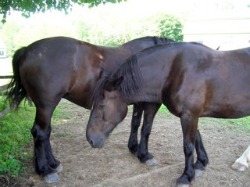
Horse manure is loaded with weed seeds, because horses only digest one-quarter of the material they eat.
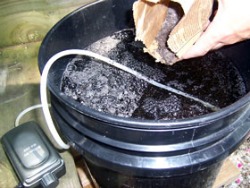
Manure teas are a great way to apply manures to plants to have a quick effect.
Cow, sheep, and horse manures are not as hot, but because they are often mixed with high carbon bedding such as sawdust or hay, they are best used composted so all the materials have a chance to break down. Other manures, such as cat, dog, or pig, should be avoided all together because they may harbor diseases that can infect humans even after decomposition.
If you have a small garden, consider using worm castings. These are high in soluble nutrients and can be used directly in the garden. You can buy bags of worm casting, but raising your own worms is fun, although you'll need a lot of worms to produce enough castings to amend a large garden.
A better way to use worm castings is to make a compost tea. The tea water is rich in nutrients and is a great way to give your plants a quick boost as a foliar fertilizer. In fact, you can make tea from any manure. Here's a little more information on making manure or compost teas.
Which manure you use may also be a matter of availability. Horse, cow, and chicken manures are probably easier to find in the community than sheep, bat, and rabbit. Buying bags of composted manure is easy and safe, but it can get expensive.
Here are some tips on the benefits of various types of manure.
Cow Manure – This is a good all purpose manure. It has a good balance of nutrients, but they are low in quantity. It's more often used as a soil conditioner to improve soil structure by adding organic matter than as a way to deliver lots of nutrients to plants. However, because of its low nitrogen content, it tends not to burn the roots of tender plants as easily. Since cows have 4 stomaches and their food is well digested, the organic matter and weed seeds are well broken down.
Chicken/Bird Manure – This manure is highest in nitrogen and phosphorous and the nutrients are quickly available to plants. The urea nitrogen can easily burn plan roots, so this must be used carefully around plants. However, the high nitrogen content makes it great for leafy greens. It has few weed seeds and diseases.
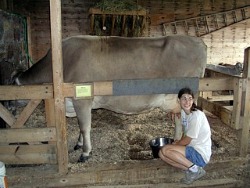
Check local farms for good sources of animal manures. An old pile of aged manure is usually best.
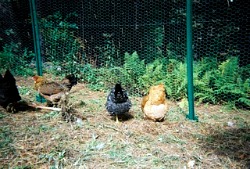
Chicken manure is high in nitrogen and phosphorous, but too much can burn the roots of tender plants.
Sheep and Goat Manure – This manure is drier than other manures, so it’s easier to use. It has a low odor and is a richer source of nitrogen and potassium than cow and horse manure. It doesn't burn plants, but can have weed seeds.
Horse Manure – Probably one of the easiest manures to find locally, it's a good all-purpose product, but like cow manure, not necessarily high in nutrients. Since a horse only digests one-quarter of the grass and seeds it eats, its poop is high in weed seeds.
Worm Castings – A great source of macro- and micronutrients, it's odorless, doesn't burn plants, even if applied fresh, and is good at stimulating microbial growth in soil. You can buy worm castings or raise the worms yourself. However, you'll need lots of worms to make enough castings to feed your garden. It's best to stretch the castings by making a tea out of the castings to feed plants more readily.
Exotic Manures – As people start raising other types of animals around their homes as pets or for commerce, you may find more exotic manure available. Don't shy away from trying their manure in your garden. Rabbit, alpaca, and llama are just some of the exotic animals that produce usable manures. If you're near a zoo, you might find elephant and rhino poop for sale. Now that's some good organic matter.
How Much Poop?As a soil conditioner, generally you can use 40 pounds of composted manure per 100 square feet of garden. That's about a bag or two of purchased composted manure. If applying composted manures to existing beds that are already very fertile, a 1- to 2-inch thick layer is probably sufficient. On poor soils, double that amount.
More information on using animal manures in the garden:Respect Manure
Rabbits for Gardeners
Using Organic Matter in the Garden
 Charlie Nardozzi is an award winning, nationally recognized garden writer, speaker, radio, and television personality. He has worked for more than 30 years bringing expert gardening information to home gardeners through radio, television, talks, tours, on-line, and the printed page. Charlie delights in making gardening information simple, easy, fun and accessible to everyone. He's the author of 6 books, has three radio shows in New England and a TV show. He leads Garden Tours around the world and consults with organizations and companies about gardening programs. See more about him at Gardening With Charlie.
Charlie Nardozzi is an award winning, nationally recognized garden writer, speaker, radio, and television personality. He has worked for more than 30 years bringing expert gardening information to home gardeners through radio, television, talks, tours, on-line, and the printed page. Charlie delights in making gardening information simple, easy, fun and accessible to everyone. He's the author of 6 books, has three radio shows in New England and a TV show. He leads Garden Tours around the world and consults with organizations and companies about gardening programs. See more about him at Gardening With Charlie.
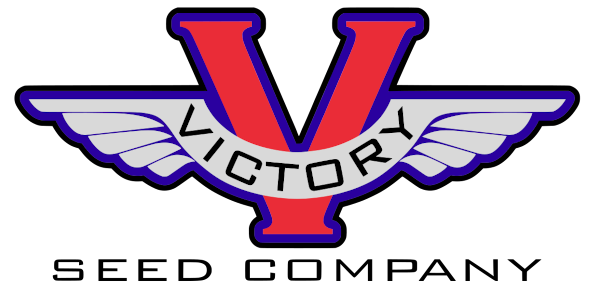 Victory Seed Company has all the seeds you want for your best garden in 2024.
Victory Seed Company has all the seeds you want for your best garden in 2024.
For 25 years, the family-owned Victory Seed Company has provided the highest quality vegetable, herb and flower seeds to families across the country. We are passionate about providing you the best seeds available that give excellent germination, robust plants, and the harvest you want. With a catalog of over a thousand varieties, we have everything, and our prices are the kinds that we'd want to pay. We have hundreds of yesterday's heirloom vegetables, as well as today's award winning hybrid selections. Get to know us by visiting our website and browsing through our online vegetable seed catalog.